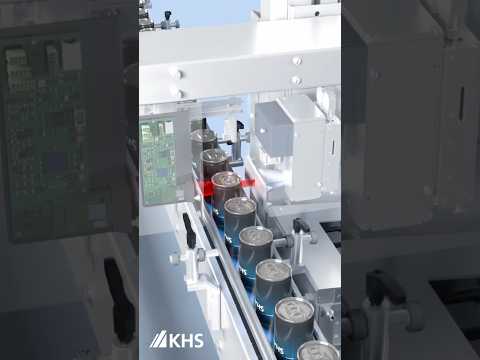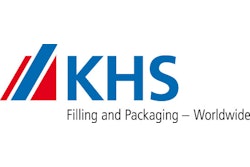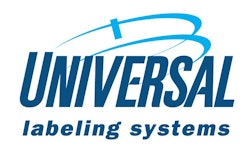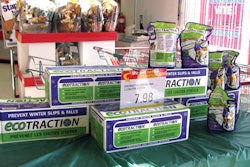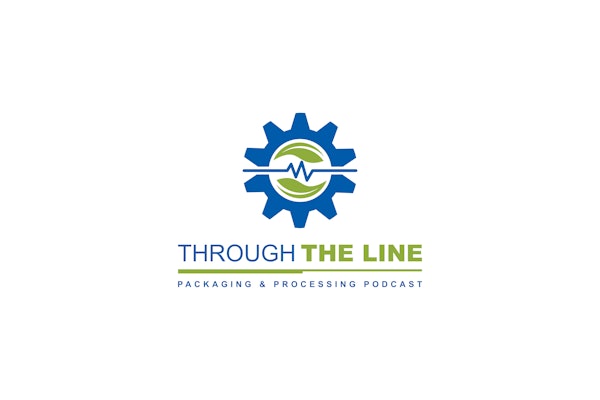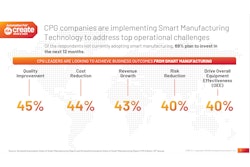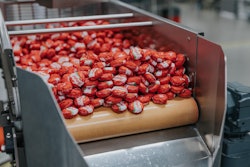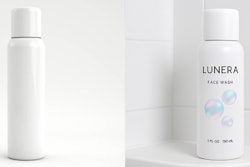Long before the current economic downturn, American FlexPack, Inc. (AFP) (www.americanflexpack.com) first opened its doors with some guiding philosophies that still serve the Green Bay, WI-based contract manufacturer/packager (CP) well nine years later. Among them are the following:
• Bring quality and innovation to customers, and help them quickly deliver their personal and skin care, cosmeceutical, and/or household cleaning products, towelettes and wipes to market in flexible packaging.
• Employ primarily used equipment and modify the machinery as necessary, as this tack provides economic, parts and maintenance, and customer benefits.
• Rely on similar equipment from one or two select suppliers so employees can easily learn how to operate and maintain the machinery.
• Utilize minimal material vendors in an effort to gain favorable pricing through larger order quantities with each vendor.
AFP runs 22 horizontal form/fill/seal lines at its warehousing, production, and headquarters plant, which expanded by 45,000 sq ft in 2007 to 84,000 sq ft. Why only hf/f/s machinery? “We have standardized our lines to decrease any downtime relating to parts availability, maintain consistency in operating technology, and provide consistent quality,” says Michael J. Mackey, the company’s president and general manager. “While flow wrappers and vertical equipment have their benefits, we find the benefits and the ease of converting to different pouch sizes to be a major factor in owning all standardized horizontal lines.”
He also points to “interchangeability in parts, sealing dies, towel heads, pump systems, and the like” as a driving force in keeping with the same family of machines, and in employing hf/f/s equipment exclusively.
“Committing to used machinery was an economic decision we made back in 2000 when we started the business, and it stuck,” he says. “We have purchased new and near-new machines and ended up modifying them in some way to meet our customers’ needs, so we went back to building customized lines from the frame up.”
Mackey says the company relies primarily on two machine vendors: HMC Products, Inc. (www.hmcproducts.com) and KHS (www.khs.com). “We rely heavily on these machine manufacturers to supply us with the parts and expertise to accomplish the ground-up rebuild and have our in-house engineers constantly improving on the true and proven [machine] designs.”
The machines, many of which are Klöckner Bartelt pouchers, run at 120- to 150-cycles/min speeds, although pouch size and product viscosities determine specific speeds. The 22 lines can run virtually any of the products/packages required by AFP’s customers, providing the versatility the CP needs. They’re also changeover-friendly.
Mackey says, “There may be up to three changeovers per day on any given line in our facility. One thing about custom-building our lines is that each of our operators and mechanics have in-depth knowledge of the horizontal form/fill/seal machines we have.”
Materials, cosmeceuticals considerations
On the materials side, AFP works primarily with four key film suppliers and printers: Glenroy (www.glenroy.com), Castle Pierce (www.castlepierce.com), Pro Label (www.pro-label.com), and Valley Label (www.valleylabel.net). Pouches range in size from 2 x 2 in. to 9 x 12 in. Mackey says purchasing larger volumes of rollstock from fewer suppliers yields economic benefits.
Most, but not all products are sold in single-use pouches, with zippers available to provide resealability if the customer requires it.
Colleen Smits, vice president of sales and marketing, explains, “AFP’s core business is in household, personal care, and cosmetics, with each category representing about 25 percent of manufacturing share, but we’re seeing substantial growth in cosmeceuticals and developing that market further.”
Mackey elaborates: “Cosmeceutical creams and lotions are a growing portion of the single-use market, and we continue to work with major brand marketers to promote their products through trial single-use doses and retail items packed for single-use convenience.”
Recently, AFP has added the capability to fill pouches with capsules or pills, with one size per pouch or various sizes and quantities up to six per single-use pouch.
Addressing sustainability and economics
Single-use packs provide consumer convenience, but as the packaging community focuses more on sustainable packaging, how can AFP and its customers tout single-use packages?
“As a contract manufacturer and packager, we ultimately follow our customers’ lead on sustainability,” Mackey explains. First, he points out AFP’s single-use packaging helps keep products fresh longer as compared to the bulk packaging that has been the standard for years. He also says there’s virtually no chance for product contamination with single-use packs.
“The integrity of products is important when we package OTC items such as sunscreens, or any product that requires high performance,” he says. “Also, we are part of a sustainability initiative being taken by the Converting Influence (www.convertinginfluence.com), an industry group that is assembling the latest in sustainable resources and approaches to converters.”
In today’s volatile financial environment, perhaps no issue is as paramount to a business as economics. Addressing the issue, Mackey says, “We have seen a trend toward leaner purchasing decisions being made by our customers. Single-item promotions have become multiple-item promotions in a single-use format, providing our customers with substantial savings by combining monthly production quantities into quarterly runs. In doing so, the size of the production run increases, making the unit price much more attractive. We are working diligently with our packaging suppliers to provide our customers with the most affordable ways to address their packaging needs and will continue to source economical solutions while paying close attention to the quality products and packaging our customers demand. And we must continue to pursue the packaging equipment strategy that we’ve followed since our inception. It’s more important to us now than ever.”


